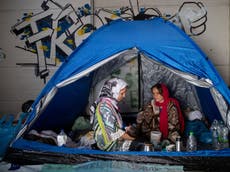The Moria refugee camp fire was a cry for help from asylum seekers dehumanised by Greece and the EU
The blaze in the Lesbos camp has been raging for years, fed by the pain inflicted by EU policies that try to deter migration
The cause of the fire in Moria refugee camp on the Greek island of Lesbos remains unconfirmed, but a government spokesperson has implied that refugees held there intentionally set the camp on fire to escape it. When the only way to break free is to burn down your own house, something must be very wrong.
But the people who were surviving inside were already homeless. They lived in shipping containers, shacks and tents, which they shared with more than 12,000 other asylum seekers in the most desperate conditions. Now they have been left to fend for themselves in the street, in the ashes of a camp they hate, where they were mistreated and will likely be told to return.
The fire did not start on Tuesday - it has been raging for years. It was fed by the pain inflicted by EU policies that try to deter migration, and fanned by restrictions on people’s movements, by the dehumanising food distribution queues, by the unfair and ever-changing asylum procedures, by a routine of humiliation, xenophobia and violence. By people’s crushed hopes for a better future – or at least for some dignity within Europe.
Then came Covid-19. When the pandemic was declared in Greece in March, MSF teams were concerned that an outbreak in Moria could become a public health disaster. In these overcrowded conditions we feared the virus could spread like wildfire.
Along with other organisations, we called on the EU and Greek authorities to evacuate those people most at risk and to decongest the camp, which at the time was packed with 19,000 people. Hundreds of people were preventively transferred, but 200 in at-risk categories for Covid-19 were still living in Moria at the time of the fire.
In July, we were forced to close a dedicated Covid-19 triage and isolation centre by local authorities who cited administrative infractions related to urban planning. The closure left Moria’s residents with no Covid-specific response and left the local health system with no isolation capacity in case of an outbreak.
When lockdown on Lesbos was lifted and the rest of the island’s population enjoyed their freedom again, the residents of Moria remained deprived of theirs. They had no chance to follow basic prevention measures, such as physical distancing or washing their hands. The message they were sent was clear: their health was less important than keeping the migration deterrence policy in place.
To add insult to injury, the Greek government openly used the detection of the first Covid-19 case inside Moria to justify further restrictions on asylum seekers on the islands and to promote plans to set up detention centres.
Public health measures, when they restrict individual freedoms, should be proportionate, necessary and legal. They should also be based on scientific evidence. There is no evidence that detention and containment, as in Moria, deter asylum seekers from leaving their countries of origin. Evidence, however, shows clearly that quarantine is ineffective and even counterproductive in overcrowded and unsanitary conditions.
No disease outbreak can be successfully controlled without the trust of communities. We know this to our cost from our experience working in other infectious diseases outbreaks. In February last year, the government-led Ebola response in the Democratic Republic of Congo was politicised and met with suspicion and hostility from local people. As a result, our Ebola treatment centres in Katwa and Butembo were attacked, with the Katwa centre burned to the ground.
We have been urging the Greek health and migration authorities for weeks to set up an adequate Covid response plan for Moria: one that is based on outbreak control, and that counts on people’s collaboration and offers dignity to the sick and to those who might infect others. The Greek authorities failed to put such a response in place, while the EU turned a blind eye and did nothing to solve the situation.
The ashes of Moria are a testament to the despair that has been manufactured by a state-sponsored system of deterrence, dehumanisation and neglect. A similar system of inhumane detention must not be reborn from these ashes or there will always be chaos and despair at the EU’s borders.
Aurélie Ponthieu is a humanitarian specialistmigration specialist for MSF (Doctors Without Borders)



Join our commenting forum
Join thought-provoking conversations, follow other Independent readers and see their replies